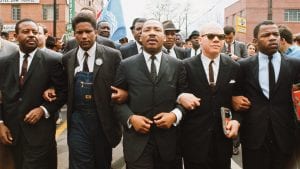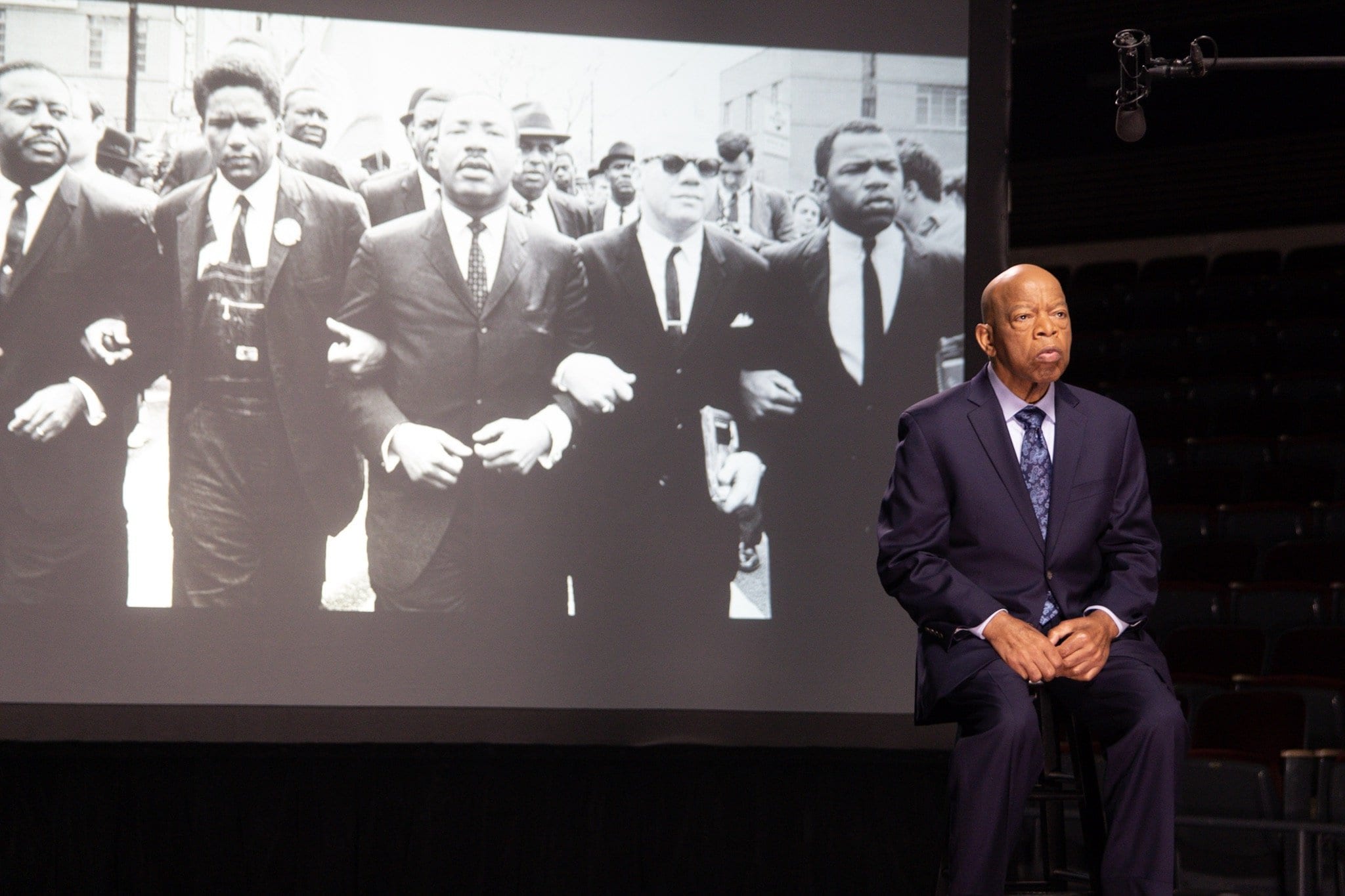New documentary is a loving tribute to an American hero
Reviewed By Jeffrey Sanzel
Freedom is not a state; it is an act. It is not some enchanted garden perched high on a distant plateau where we can finally sit down and rest. Freedom is the continuous action we all must take, and each generation must do its part to create an even more fair, more just society.
— Across That Bridge: A Vision for Change and the Future of America by John Lewis
When Congressman John Lewis passed away on July 17 at age eighty, the world lost the man who was called “one of the most courageous persons the Civil Rights Movement ever produced.” Lewis was a beacon for the protection of human rights and won the respect and admiration of colleagues on both sides of the aisle.
Having dedicated his life to the Civil Rights movement, he was a member of the “Big Six” who organized the legendary 1963 March on Washington. In 1965, he led the first of three Selma to Montgomery marches across the Edmund Pettus Bridge. In the infamous Bloody Sunday (March 7, 1965), he was one of the nearly six hundred marchers who were viciously attacked. Lewis suffered a skull fracture, and he bore the forehead scars for the rest of his life.
Now, Dawn Porter has directed the powerful and absorbing documentary John Lewis: Good Trouble. The title refers to a belief that Lewis held his entire life:
Do not get lost in a sea of despair. Be hopeful, be optimistic. Our struggle is not the struggle of a day, a week, a month, or a year, it is the struggle of a lifetime. Never, ever be afraid to make some noise and get in good trouble, necessary trouble.
Lewis said that age fifteen he was inspired by Dr. Martin Luther King Jr. and Rosa Parks to get into “good trouble.”
The ninety minutes are a portrait of a man of deep belief and unfathomable courage. Much of the film focuses on the all-important voting rights. Instead of taking a traditional linear biographical approach, it alternates between his work in the 1960’s with his continued work in the 2000’s. Porter is clearly drawing a parallel between the two eras. The first where there was a struggle to secure equal voting opportunities for African Americans and other minorities, and the present where these secured rights are once again imperiled.

The documentary opens with and frequently returns to Lewis watching film footage of the Civil Rights movement in the 1960’s, much of which he has never seen. In his stillness is the wisdom of a man who has seen much and experienced more. His pain is mixed with pride and awareness. Occasionally, he comments on what he is watching, but mostly he just takes it in. It is incredibly moving in its simplicity as he reviews many of the most disturbing moments in a long history.
Interspersed with archival clips, many featuring Dr. Martin Luther King Jr. as well as John F. Kennedy, Robert Kennedy (for whom Lewis worked at the time of his assassination), George W. Bush, Ronald Reagan, Lyndon B. Johnson, and Barack Obama, are short interviews including Hillary Clinton and Bill Clinton, Elijah Cummings, Nancy Pelosi, Alexandria Ocasio-Cortez, Cory Booker, and Ilhan Omar, all praising the Congressman’s work and his commitment. These help shape the overall picture of Lewis and his journey.
He is shown on the campaign trail with young, vibrant contenders, frequently first time candidates. Beto O’Rourke and Stacey Abrams are just two of the many he has supported. There are wonderful clips of his unchecked joy watching the returns of the 2018 mid-terms.
The film gives only a sketch of his personal life and history, with appearances of his sisters and brothers, who clearly love him but remain slightly in awe of his accomplishments. His wife and son are briefly touched upon, and her passing in 2012 was clearly a blow. There is a brief bit about his friendship with Julian Bond that turned acrimonious when they ran against each other. Few details are given but clearly this was a difficult personal time in his career.
What continues to come across is Lewis’s incredible warmth and generosity, a gentle leader and a continuing inspiration. His humor is in stark contrast with the often fiery passion he shows when speaking. His speeches are mesmerizing in their raw honesty. These are as much a part of him as are the amusing anecdotes that are introduced throughout. (His preaching to the chickens as a boy can only be appreciated by listening to his telling.)
A viral dance, his reaction to the election of President Obama as well as that president’s gratitude towards him, and his easy banter with his longtime chief of staff, Michael Collins, are just some of the glimpses into his gracious humanity. His message of non-violence is continually emphasized. The right to protest but the responsibility to do it without intentional harm was deeply rooted in his choices and actions.
But central to the film and Lewis’s story is the quest to eradicate voter suppression. This is been the head and heart of Lewis’s life. In addition to the many important moments of the 1960’s is the bipartisan Voting Rights Act of 2006. The subsequent 2013 attack on it led to the 2016 election being the first without the protection of this act.
I fear that we are facing the end of democracy. As long as I have breath in my body, I’ll do what I can.”
The film builds to a quick sequence highlighting the dozens of bills that Lewis co-sponsored, the breadth of his work including not only voting and civil rights but gun control, health care reform, immigration, and a host of other important social issues. It is clear that his goal has been to make a better, freer, and more equal world:
As a nation and a people, we are not quite there yet; we have miles to go.
Porter never shies away from presenting disturbing and often brutal images, including attacks during marches, sit-ins, and lunch counter desegregations. There is nothing sensationalist about her choices; they are an honest representation of a dark blot on our country’s history. But the film truly honors the spirit and accomplishments of John Lewis. It is a documentary that should be viewed by families and seen in classrooms, discussed, contemplated, and taken to heart. The final words of the film are appropriately his:
We will create a beloved community. We will redeem the soul of America. There may be some setbacks, some delays … but as a nation and as a people, we will get there. And I still believe, we shall overcome.
Rated PG, John Lewis: Good Trouble is now streaming on demand.







